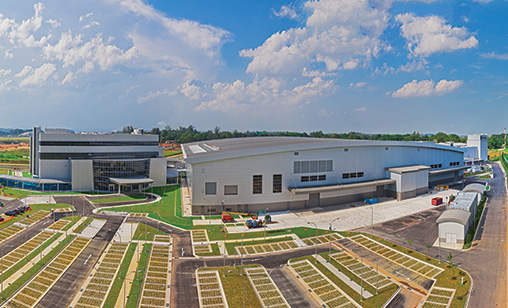Industry Insight Special Report
Top of Asia’s aerospace league
Singapore is strengthening its position as the industry innovation hub for the region. More and more global aerospace manufacturers are establishing research centres in the Lion City with the goal of developing technology that will propel the airline industry into the digital age.
February 1st 2018
By pumping investment into the region like no other nation in the region, Singapore has become the unchallenged centre for aerospace innovation. Read More » Encouraged by a committed government and sustained investment programs, engineers and IT workers from global OEMs to local start-ups are focusing on reinventing airline operations for the new digital world.
There are more than 130 aerospace companies based in Singapore, but there also is a growing presence of communications and space companies from leaders such as SES and Inmarsat to space start-ups like Astroscale.
 |
To demonstrate the importance Singapore attaches to its aerospace innovators, its Economic Development Board (EDB) reaffirmed its commitment to the industry in January with the launch of the Aerospace Industry Transformation Map (ITM). The ITM will pursue operational excellence, drive innovation in emerging technologies and equip Singaporeans with the relevant skills for future space age development.
As part of its expansion in the engineering sector, Singapore wants companies to invest in advanced automation equipment, software and engineering capabilities to upgrade existing products and manufacture next generation aircraft components.
At the same time, the city’s government will support new degree programs at local educational institutions and promote up skilling for aviation professionals. EDB said the ITM would boost the aerospace industry by US$3.05 billion and would create 1,000 jobs by 2020, after an average annual growth of 8.6% over the past two decades.
The future will undoubtedly be digital. As Asia-Pacific passenger traffic continues to fuel global aviation, the ability to capture, analyse and act on data will make or break companies in unpredictable markets.
OEMs like Airbus, Boeing, Rolls-Royce and Honeywell are making this future a reality and establishing multi-million bases in Singapore to ensure long-term success. The city intends to continue to develop its manpower skills and infrastructure to support growth in manufacturing, MRO and related aftermarket services.
Such a policy commitment has resulted in Singaporean maintenance, repair and overhaul (MRO) industry winning 10% of global MRO output. “Strong growth in the Asia-Pacific presents opportunities across the value chain in manufacturing, MRO and aftermarket industry segments. Aerospace companies will need to broaden their Asian footprint and innovate to address these new market needs,” said Singapore’s minister for trade and industry, S. Iswaran.
These opportunities are being seized by the home-grown Singapore Aerospace Manufacturing (SAM). Between manufacturing automation and better software, the aircraft components manufacturer expects productivity gains of up to 30% in the next decade.
Labour-saving automation and anaytics can be a great equaliser for firms regardless of size. Anchored by home-grown enterprises and MNC partners, Singaporean aerospace firms offer comprehensive nose-to-tail services, and the ITM has identified several ground support automation projects in the works.
Singapore Airlines Engineering Company (SIAEC) has begun deploying a one-man remote-controlled aircraft pushback air tug, to allow a pushback operation on narrow body aircraft to be done by one person instead of the current requirement of two.
The Automated Passenger Loading Bridge (PLB) will use precision lasers and cameras, to guide the docking process safely and autonomously. Under development by ST Dynamics, the advanced engineering centre of ST Engineering, it is the world’s first system to be designed for robust operations under harsh weather conditions like heavy rain. If aerobridge tests prove successful this year, ST will extend the technology to other vehicles like catering trucks and pave the way towards a seamless, efficient and autonomous apron.
As the world’s largest third-party MRO provider, ST Aerospace plans to bring data-driven decision-making to its clients as well as its own internal processes. Its digital and productivity transformation initiative, Smart MRO, will offer customized predictive maintenance, drones for aircraft inspection and additive manufacturing for spare parts, all in the name of better cost efficiency and turnaround time.